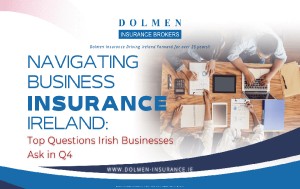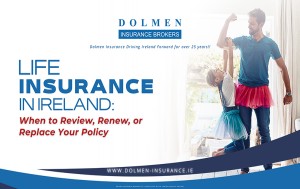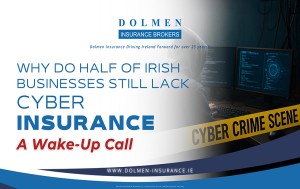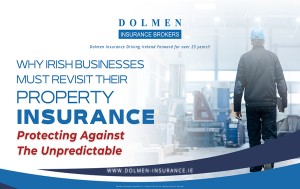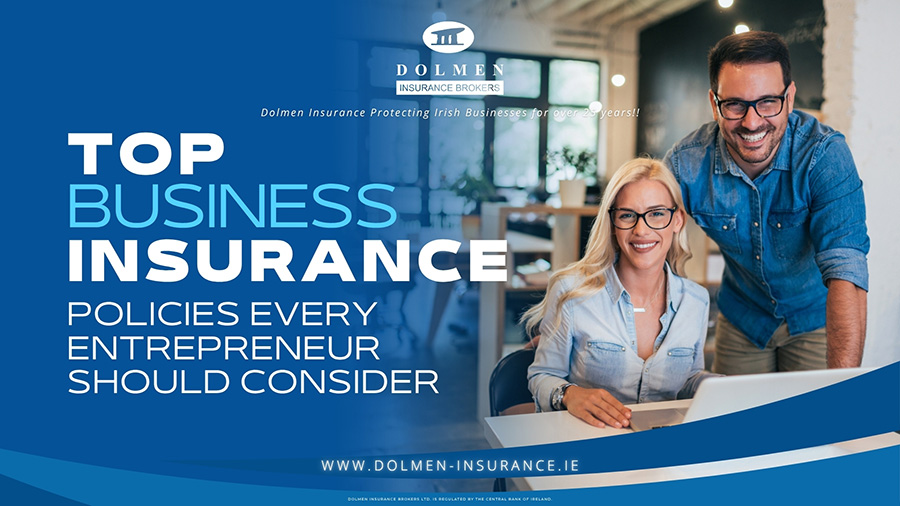
Launching and growing a business in Ireland demands more than passion and hustle. It also requires protecting your business from unexpected risks. Whether you operate a family-run café, a tech start-up, or a retail store, insurance can safeguard what you build. Indeed, statistics show that many Irish businesses face costs from claims and legal fees amounting to millions yearly. With 99.8% of Irish enterprises classed as SMEs, tailored protection is essential . So, what types of business insurance should Irish entrepreneurs consider? Below, our business insurance team outlines the top policies, explains how to choose the right cover, highlights the benefits of comprehensive protection, and offers practical tips.
Essential Business Insurance Policies
Every entrepreneur should assess which policies apply to their business. Some cover generic risks such as property damage or liability claims. Others address industry-specific exposures. While some policies are optional, others may be required by regulation or contract. The following insurances stand out.
1. Public Liability Insurance
Public liability insurance (PLI) covers legal expenses and compensation if a customer, visitor, or member of the public is injured on your premises or by your business activities. The Law society of Ireland reported, that in Ireland, falls accounted for nearly 62% of all PLI incidents between 2019 and 2023, resulting in over €130 million paid in compensation . Even minor accidents can trigger costly settlements. In 2023, PLI awards totalled more than €33 million, with a median settlement of €12,414. Without this cover, a single incident could threaten your financial stability. Therefore, PLI is essential for most businesses interacting with the public.
2. Employers’ Liability Insurance
If your business employs staff, employers’ liability insurance is mandatory in Ireland. It covers compensation, legal fees, and medical costs arising from work-related injuries or illnesses. Central Bank data shows that average grants cost €38,446 for EL by 2022, a 34% increase since 2019. Without this policy, any workplace accident might bankrupt your operation. Invest in a robust EL policy to ensure compliance and safety.
3. Commercial Property Insurance
A hit, fire, theft, or storm can destroy your workspace. Commercial property insurance covers structural damage and business contents such as stock, equipment, and furnishings. Given the recent inflation in construction costs and materials, replacement value has increased significantly, building and repair costs rose alongside CPI increases (8.2% in 2022, 4.6% in 2023) . Without sufficient cover, rebuilding costs could bankrupt small enterprises. So, property cover is essential to protect fixed assets.
4. Business Interruption Insurance
Even with property cover, your business may still suffer income loss during repairs. Business interruption insurance recovers income and covers continuing costs such as staff salaries while your business remains closed due to an insured event. For example, if your café floods and closes for renovations, this policy helps you survive the downtime. It keeps the lights on and the bills paid.
5. Professional Indemnity Insurance
Certain sectors, such as consultancy, accounting, digital design, and engineering, inherently carry risk of professional error. Professional indemnity insurance (PII) protects against claims of negligence, breach of contract, or faulty advice. These errors can result in financial losses for clients, opening you up to legal action. PII ensures you can defend your reputation and cover legal costs.
6. Directors & Officers (D&O) Liability Insurance
This coverage protects company directors, owners, and officers from claims alleging mismanagement, regulatory breach, or misconduct. A growing number of Irish business operators face personal liability claims. D&O insurance covers legal defence and compensation, ensuring business leaders can act with confidence.
7. Cyber Insurance
In our digital age, cyber threats pose real dangers. Breaches can disrupt operations, damage reputation, and lead to data fines or ransom payments. Even small Irish enterprises can fall victim. Cyber insurance helps cover costs related to incident response, data recovery, legal support, and communications.
8. Commercial Vehicle Insurance
If your business uses vans or trucks, you must have adequate commercial vehicle insurance. This differs from personal cover. It typically includes third-party liability, damage cover, and protection for goods in transit. Van crashes or goods damage can result in expensive liability claims.
9. Product Liability Insurance
Do you manufacture or sell goods? Product liability insurance covers defects that cause injury or damage. Irish PLI stats suggest that workplace and product-related incidents make up a significant portion of claims. For example, between 2019 and 2023, nearly 30,000 PLI claims occurred, costing around €130 million in awards . Product liability insurance can limit your exposure.
10. Employers’ Liability Plus
Some insurers offer extensions or combined packages that include coverage for legal defense in unfair dismissal cases, statutory fines, or employment tribunals. While not essential, this add-on can benefit larger employers with complex HR exposures.
How to Choose the Best Business Insurance
Selecting the right insurance policy goes beyond price. It requires careful assessment of your risks and business needs. By following clear steps, you can find the right cover, without paying for extras you don’t need.
1. Understand Your Risk Profile
Start by identifying what could go wrong in your business. Ask: do clients visit your premises? Do employees use vehicles or machinery? Do you work in cyberspace? For SMEs, centralised sources show that 70% of PLI claims involve slips, trips, and falls . Meanwhile, professional errors are rising among consultants and tech firms. Mapping your risk gives clarity on which policies matter most.
2. Evaluate Coverage Limits
Always check the indemnity limits of any policy. Standard Irish PLI policies offer €6.5 million or €13 million limits. Make sure your limit meets contract requirements. Also note if indemnity limits are per claim or in aggregate. For employers’ liability, similar indemnity levels apply. D&O cover often has lower caps, so confirm adequacy.
3. Inspect Exclusions and Conditions
Insurance policies often list exclusions and conditions. For instance, PII policies may exclude intentional wrongs or fines unless extensions are added. Cyber insurance may not cover deliberate breaches by staff. Read the fine print thoroughly, or seek broker guidance.
4. Review the Claims Record
Central Bank reports show that over 90% of policies had premiums under €5,000 in 2022. Yet insurers posted 13% profit margins on EL, PL, and property packages, higher than standard benchmarks of 4–6%. That implies customer costs may not reflect underlying risk. Look for insurers offering competitive premiums, efficient claims handling, and transparency in cost-benefits. Brokers Ireland notes that 72% of policies are bought via brokers . Brokers can help sift through insurers and negotiate rates. At Dolmen we pride ourselves on getting our clients the best cover and the best price.
5. Consider Package Deals
Most Irish SMEs bundled EL, PL, and property insurance in single policies in 2022, covering nearly 86% of all such policies. Bundles simplify administration and often reduce premiums. Evaluate combining coverages where suitable.
6. Analyse Premium Drivers
Premium costs rise due to many factors. Central Bank data shows an average 8% rise in package policy premiums from 2021 to 2022, despite falling settlement values. Rising inflation, legal costs, and risk exposure drive this increase. If insurers hold high profits without passing savings to customers, switching policy or insurer might yield savings. Check premium trends and shop around at renewal.
7. Seek Local Broker Expertise
Irish brokers understand the local legal and regulatory landscape. They can guide you through appropriate limits, exclusions, and add-ons. Brokers also monitor market trends and insurer performance, helping to secure timely renewal options.
8. Review Annually
Your business changes over time. You might hire staff, add vehicles, or open new premises. Review your insurance policies annually to ensure your cover aligns with current risk. Failure to update your policy may result in reduced protection at claim time.
Benefits of Comprehensive Business Insurance
Rather than seeing insurance as a cost, entrepreneurs should view it as strategic protection. A well-designed insurance package offers multiple advantages.
Mitigated Financial Risk
Costly claims and lawsuits can collapse small companies. With average EL or PL payouts around €20,000–€40,000 and growing legal costs, proper cover can protect your cashflow and assets . Insurance equips you to recover and rebuild quickly.
Continuity and Recovery
Business interruption cover ensures you can continue to pay fixed costs during downtime. Reopening with minimal disruption safeguards client relationships and your reputation. Moreover, swift crisis management reduces long-term impact.
Regulatory Compliance
Some policies are mandatory. Employers’ liability is legally required if you employ anyone. Additionally, many contracts, such as those with public bodies or landlords, require PLI or property insurance. Having cover opens doors. Failure might shut them.
Enhanced Credibility
Presenting a comprehensive insurance package enhances your professional image. Clients, suppliers, and financiers perceive you as reliable. It signals that you take your obligations seriously.
Competitive Advantage
When pitching for tenders, many public and private-sector projects call for proof of insurance, often specifying indemnity limits. Having appropriate insurance puts you in contention. Without it, you may lose contract opportunities.
Legal Support
Beyond compensation, insurers often offer legal guidance and support in case of disputes or claims. Experienced claims handlers, defence lawyers, and mediation services improve outcomes. You gain peace of mind knowing professionals guide you through complex processes.
Stress Reduction
Uncertainty and legal complexity can sap your energy. Knowing you are adequately covered lets you concentrate on your business rather than worrying about “what if” scenarios.
Tips for Entrepreneurs
Here are practical actions for every Irish business owner to maximise insurance value and reduce risk:
1. Maintain Safety Records
Document hazard inspections, health and safety training, and maintenance logs. These records can act as evidence if claims arise and may reduce your risk in legal proceedings.
2. Display Signage Clearly
Post “Caution” and “Wet Floor” signs when hazards are present. Visible warnings can prevent accidents and help defend against negligence claims.
3. Train Staff Ad Hoc and Regularly
Empower employees through safety awareness training. From manual handling to cyber hygiene, educated staff reduce risk.
4. Report Incidents Promptly
Notify your insurer immediately after an incident. Swift reporting allows faster investigations and claim handling.
5. Use PIAB and Mediation
Where possible, use the Injuries Resolution Board and its mediation service. Settling claims this way is cheaper and quicker. Confirm your insurer supports this route.
6. Keep Contracts Updated
Include clauses in supplier or subcontractor agreements requiring them to hold insurance and indemnify you where necessary. Vet their cover before working with them.
7. Share Full Risk Details with Broker
Be transparent about all potential exposures, premises, vehicles, subcontractors, etc. Full disclosure maintains policy validity and avoids claim denials.
8. Regularly Compare Insurers
In a market where average premiums rose 8% in 2022 despite falling claims, renewal time is strategic. Comparing insurers at least annually can result in savings and improved service.
9. Watch Industry Changes
Stay updated on reforms—like the 2021 personal injury guidelines, ongoing PIAB updates, and proposals for increased awards. Knowledge allows proactive adaptation.
10. Budget for Premium Increases
Framework your cashflow to accommodate premium fluctuations, which could be driven by inflation, claims trends, or regulatory changes.
A lot to consider, so talk to the experts.
Selecting business insurance is not a luxury, it is a fundamental business decision, especially for Irish entrepreneurs. With SMEs forming the vast majority of Irish businesses, having tailored insurance is both essential and strategic.The cost of a large claim, both financial and reputational, can destroy young ventures overnight.
Comprehensive cover across public liability, employers’ liability, property, professional indemnity, and cyber ensures that your business can grow securely. At the same time, package policies, informed broker advice, and annual reviews will help you maximise value without over-insuring.
At Dolmen Insurance, we understand the unique pressures Irish entrepreneurs face. We help businesses balance the right level of cover with affordable premiums. Our experts can assist you in mapping exposures, comparing policies, and managing renewals. If you want to protect your business, explore your insurance options today.
Protect your business today so you can confidently build tomorrow.
If you are looking for affordable, comprehensive insurance cover, consider Dolmen Insurance. Get in touch today to discuss all your insurance options and explore the benefits of working with Dolmen Insurance.
Whether it's Commercial Insurance, Mortgage Protection to Life Insurance , home insurance or car insurance we have you covered.
Contact Us Today.
Note: The information provided in this article is for general guidance purposes only and does not constitute professional advice. For personalised insurance recommendations, please consult with our qualified insurance advisor.
